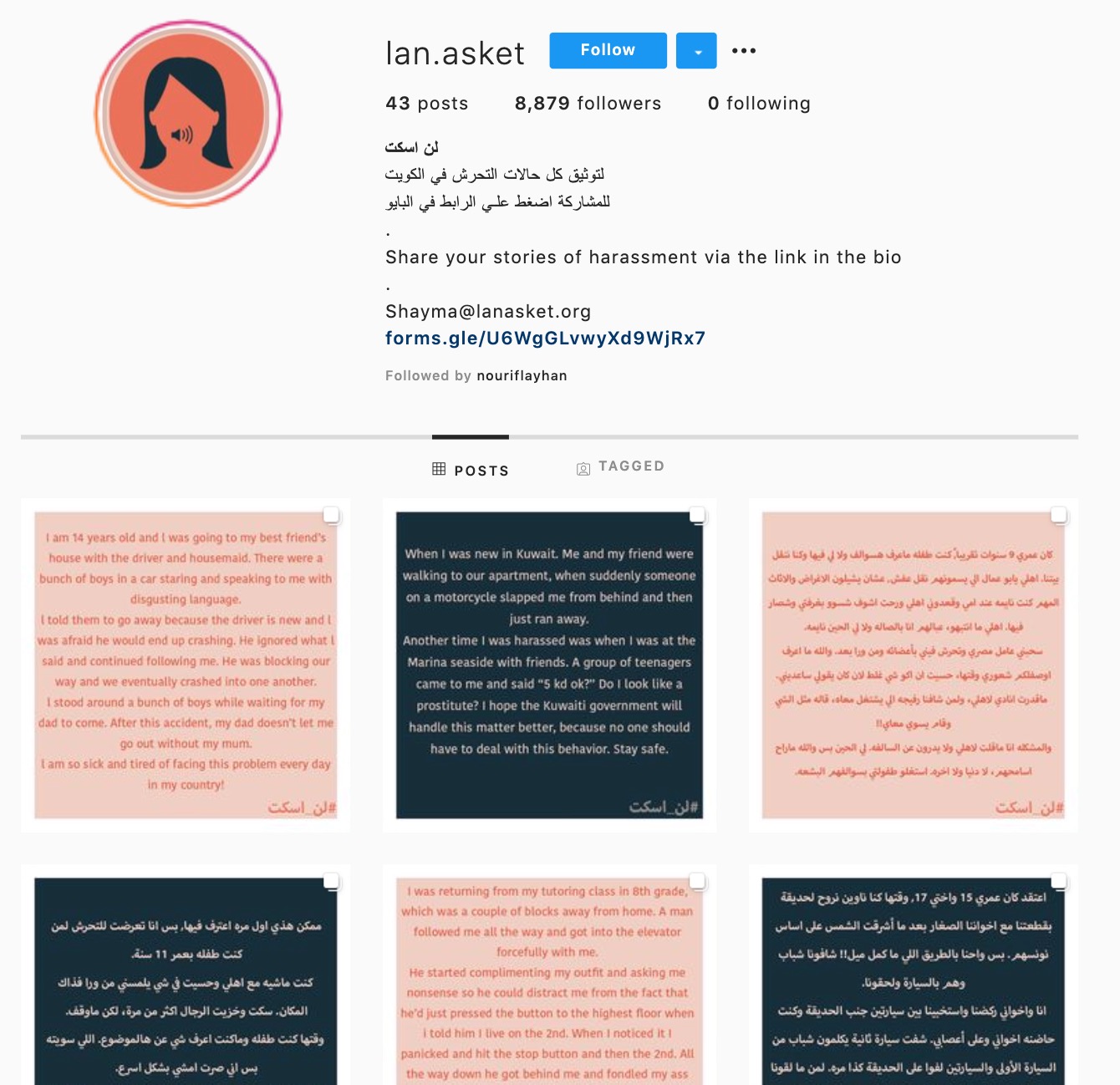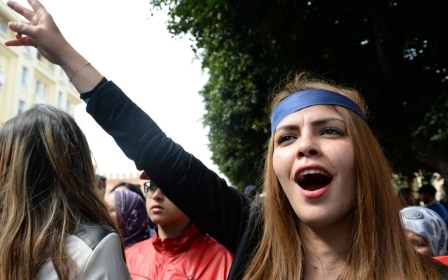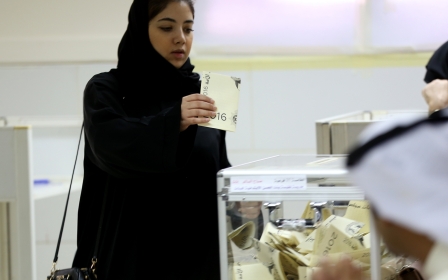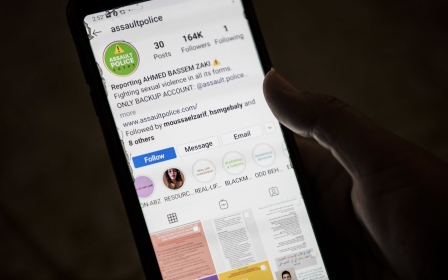Kuwaiti women speak up about sexual harassment online

"I will not be silenced."
This has been the rallying cry for women in Kuwait in recent weeks, as a new online campaign has sought to highlight the prevalence of sexual harassment in the country and hold harassers accountable.
The campaign was sparked by popular Kuwaiti-American fashion blogger Ascia al-Faraj, known online as Ascia, who has over two million followers on Instagram.
'Until there is lasting change, we will not be silenced. We will not be silenced on this'
- Ascia al-Faraj
The blogger took to Instagram last week to address her followers, informing them that from now on she would be raising awareness of what she described as a major issue in the country.
Faraj had previously posted an emotional and passionate video expressing her anger about sexual harassment in Kuwait.
New MEE newsletter: Jerusalem Dispatch
Sign up to get the latest insights and analysis on Israel-Palestine, alongside Turkey Unpacked and other MEE newsletters
“Every time I go out, I get harassed," she said in the video. "I’m just minding my own business. Do you have no shame? The problem here is that men here have no shame.”
In parallel, an Instagram page called "Lan asket" (I will not be silenced) was launched last week, calling on women to share their experiences and testimonies of sexual harassment.
Since the page was started, it has amassed over 8,000 followers in a conservative kingdom where speaking about such issues is typically seen as taboo.
The Instagram page was launched by Shayma Shamo, a 27-year-old doctor who studied abroad and moved back to Kuwait last year. The platform has also been used to share infographics about what constitutes harassment and ways to dismantle justifications for harassment.
Dozens of testimonies have been shared on the page. In one, a 14-year-old girl says she ended up in an accident after she was pursued by a group of boys in another vehicle. Now, she does not leave her house alone.
Other testimonies describe being followed, touched without permission, and being on the receiving end of lewd comments.
'We must speak up, unite and defend each other because what is happening is unacceptable'
- Shayma Shamo
“As soon as I opened the account, the messages started to pour in...from women and girls who have experienced verbal, physical and sexual harassment... We must speak up, unite and defend each other because what is happening is unacceptable,” Shamo told AFP.
While the movement is still relatively new, Faraj said she expected the Kuwaiti government to react quickly.
“We still have not heard any official word from the government about this campaign, despite how big it is now," Faraj wrote on Instagram on Tuesday. "I’m sure it will eventually come but if it does not, I’ll be really disappointed that after two weeks of this discussion our voices mean nothing.
“Until there is lasting change, we will not be silenced. We will not be silenced on this,” she added.
The campaign has also spread on Twitter, where many are using the hashtag "I will not be silenced" to demand government policies and laws to protect women against sexual harassment, as well as dispel stereotypes that exist around the issue.
The US Embassy in Kuwait published a tweet acknowledging the social media campaign.
Last week, Faraj addressed her followers saying that she was choosing to speak about the issue in Arabic in order to achieve change and get the message across to those who she feels need to hear it most.
“We’re in a predominantly Arabic-speaking country and those that need to hear it to change and to change how their households function or the laws in the country speak Arabic,” she said.
The social media campaign has also addressed abuse and harassment experienced by immigrant women living and working in Kuwait.
'The movement that is happening right now is all encompassing for all women in Kuwait, it’s not just for Kuwaiti women or for the benefit of Kuwaiti women'
- Ascia al-Faraj
Migrant workers comprise around two thirds of the population in Kuwait, according to a report published by Human Rights Watch (HRW), and are particularly vulnerable to abuse due to a lack of protections under the Middle East's exploitative kafala system.
“The movement that is happening right now is all encompassing for all women in Kuwait, it’s not just for Kuwaiti women or for the benefit of Kuwaiti women,” Faraj says in one of her videos posted to social media.
"The expat community is an incredibly vulnerable community, and are sometimes harassed to a level that Kuwaiti women will never understand because they do not have the safety of the fallback of their nationality to maybe scare men out of harassing them.
"This is a fight for every single woman in this country, not just women who hold the nationality.”
The anti-harassment campaign has received a lot of support online, with thousands of people using the hashtag. However, the campaign has also caused controversy amongst those who believe speaking out on such issues is shameful.
Rothna Begum, a senior researcher at HRW, told AFP that the campaign was particularly important in a country where sexual harassment and abuse are often not taken seriously.
“These accounts being published are incredibly important to give Kuwaitis a sense of what harassment actually looks like and the terrible harm it causes,” she said.
According to HRW, Kuwait has no laws prohibiting domestic violence, sexual harassment, or marital rape.
Women won the right to vote and run in elections in Kuwait only 15 years ago. While a record 29 women ran for office in parliamentary elections in December, none were elected - a blow to the status of women who have fought hard over recent years for more representation in the oil-rich emirate.
The campaign in Kuwait follows similar movements in recent years in countries such as Tunisia and Egypt.
Middle East Eye delivers independent and unrivalled coverage and analysis of the Middle East, North Africa and beyond. To learn more about republishing this content and the associated fees, please fill out this form. More about MEE can be found here.





